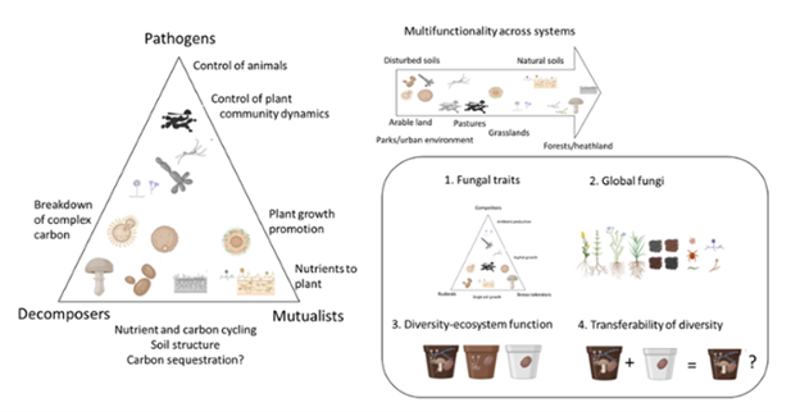Emilia Hannula
Associate professor
- Name
- Dr. S.E. Hannula
- Telephone
- 071 5277489
- s.e.hannula@cml.leidenuniv.nl

Dr. Emilia Hannula is a soil ecologist passionate about all soil creatures and especially soil fungi.
More information about Emilia Hannula
News
PhD candidates
Professional experience
Emilia is an expert in soil ecology with special love for soil fungi. Her research focuses on understanding how composition, traits and interactions between soil biota regulate ecosystem functions, how disturbances affect soil biota and subsequent functions, and ultimately how soil biodiversity and functions can be restored.
She works on topics such as plant-soil feedbacks, the effects of soil diversity on plant and animal health, temporal and spatial stability of microbiomes, effects of climate and land-use change on soil fungi, foodwebs, and functions, and on ways to steer soil fungal communities for better functioning (soil) ecosystem. She is especially interested in trait-based analyses of fungi and soil multifunctionality in relation to sustainable future. Her expertise includes tracing carbon through system using stable isotopes, (molecular) microbiome analysis, and networks.
She completed her PhD in 2012 in Microbial Ecology department of NIOO-KNAW and Institute of Biology Leiden. After the PhD she did a post-doc in large European project (‘EcoFinders’) investigating the effects of land-use on soil fungal communities using molecular fingerprinting methods and tracing the carbon to soil organisms (DNA-SIP). After that she worked while in another European project (‘SoilCare’) and analysed soil fungi across Europe and further worked in another project as a post-doc in NIOO-KNAW department of Terrestrial Ecology on plant-soil feedbacks and soil fungi affecting plant communities and plant growth. In 2019 she gained personal funding from Tor and Maj Nessling foundation to study the effects of soil disturbances on soil fungi and carbon cycling in soils. She is currently a guest researcher in NIOO-KNAW and you can read about her previous work here. Since 2021, she has worked in the Institute of Environmental Sciences (CML) at Leiden University first as assistant professor (2021-2024) and currently as an associate professor (since 2024). She currently leads a NWO-KIC consortium linking soil health to human gut health and in 2024 obtained a VIDI-grant. She co-leads the programme on future food systems and leads the soil ecology group within CML.
She strives to lead a group that is a safe, healthy, productive, and inclusive environment for everyone.
Research topics
- The role of soil fungal traits in ecosystem functions across ecosystems (VIDI; 2024-2029). Despite the established fundamental importance of fungi in various soil processes, very little is known about the fungal traits associated with soil multifunctionality. In this topic modern molecular techniques and isotopes are combined with cultivation based techniques to create trait-based framework to disentangle the diversity of fungal traits associated with soil functions across a land-use gradient, ranging from bacteria-dominated degraded arable lands to fungal-rich forest soils. Trait-based community assembly effects on soil functions explored and strategies to steer fungal traits that restore soil multifunctionality are investigated. The obtained fundamental understanding of how fungal traits determine ecosystem multifunctionality will provide a solid basis to design management strategies that optimize the life-support functions of soils. Read more about this here.
- Linking soil microbiomes to ecosystem health (NWO-M2 2023-2027 and others). In the core of Emilia’s interests are the effects of soil (fungal) biodiversity on ecosystem functions such as carbon use efficiency and ultimately carbon storage, soil structure and plant growth. This research further extends to soil-plant-animal interactions and in its core is gaining fundamental knowledge on effects of soil communities on relevant ecosystem functions and to use this knowledge to steer these functions by management decisions.
- Linking soil microbiomes to human gut health (NWO-KIC; 2023-2029). In this consortium, lead by dr. Hannula, interdisciplinary consortium investigates how soil biodiversity and soil management affect plant quality and microbiome and ultimately human health. Importantly, governance perspective is taken to investigate what transitions are needed to connect food production to human health and ways to steer soil health for better quality food are explored. Read more about this research here and here.
- Stressors affecting soil ecosystem functions (Tor and Maj Nessling foundation 2020-2022; Climate smart forestry project; student projects). In the context of climate change and other anthropogenic disturbances, soils are expected to lose species and consequently their functions. Across ecosystems (forests, grasslands, arable land) the group is investigating effects of various stressors such as drought on soil communities and functions. Read more about the forest experiment here. Further research is being done in the Polderlab on transitions to climate adaptive food systems.
- Transferability of soil-biodiversity and steering systems. Native grassland species have a very diverse beneficial microbiome that can partly be transferred to agricultural soils by growing these plants in the soils or by soil inoculations. Furthermore, microbes are shared between soils, plants and animals feeding on both. Interesting questions rising is how wide spread this sharing of microbes is, what are its ecosystem level consequences, and are microbiomes transferred between organisms interacting in the food web and for example in host-parasite relationship. I will further address the question if soil microbiomes can be steered and transferred to new locations as part of nature restoration.

Associate professor
- Faculty of Science
- CML
- Environmental Biology








